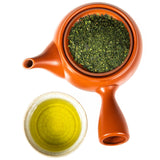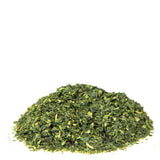DUE TO HIGH DEMAND, THIS TEA IS OUT OF STOCK
IT WON'T BE AVAILABLE UNTIL THE NEXT HARVEST IN SPRING.
SIGN UP FOR OUR NEWSLETTER TO STAY UPDATED
One quiet afternoon, a young disciple asked Sensei Lao Cha:
— Sifu, everyone talks about Matcha – the ceremony, the foam, the setting. But hardly anyone ever mentions Tencha.
Lao Cha nodded.
— Matcha is the melody everyone hears. But Tencha… Tencha is the instrument. Without the leaf, there would be no song. But don’t think of Tencha only as a means to an end. It has its own music if you’re willing to listen. It may not be whisked or performed, but steeped quietly, it shows you something different.
The young monk took another sip, slower this time.
— It’s softer… but not less.
— Exactly, said Lao Cha. Just different. And worth paying attention to.
Tencha is a unique kind of tea that's less commonly talked about than its famous successor, Matcha, but shouldn't be overlooked if you appreciate the finer points of tea culture. The name "Tencha" (碾茶) comes from two Japanese words meaning "grind" and "tea," hinting at its primary use: it's the leaf used to make Matcha. But there's more to Tencha than just being a precursor to Matcha.
Before harvest, Tencha is shaded for about three weeks, which boosts L-theanine and chlorophyll and makes the leaves richer in nutrients, giving the leaf its signature sweetness, umami, and vivid green color. After steaming and drying, the leaves are de-stemmed and de-veined, resulting in light, flake-like pieces. These aren’t rolled, so they retain a unique texture and structure
This Tencha is a blend of Saemidori, Asanoka, and Okumidori cultivars, sourced from organic farms in Kagoshima and Shizuoka, and blended by Tea Master Mitsuhiko Masuda – a man who puts his heart and soul into his work.
You'll notice its sweet, malty aroma with intriguing notes of artichoke and even a hint of dried raspberry from the dry leaves. It's a tea rich in umami, reminiscent of Gyokuro on the first infusion and balanced with a gentle hint of bitterness on the second steeping. There's some nuttiness there too, reminiscent of almonds, alongside vegetal notes of broccoli and sweet pea. – It's a complex profile, rewarding to explore.
While Tencha is traditionally processed into Matcha, there's a growing interest in enjoying it in its loose-leaf form. It offers a different experience, one that's less about the creamy frothiness of Matcha and more about savoring the leaf's own character.
Watch a video of us tasting Tencha
- Organic
- Cultivar: Okumidori, Saemidori, Asanoka
- Region: Kagoshima, Shizuoka
![]() 125-135℉ / 50-55℃ for the first infusion; 150ºF/65ºC for the second one
125-135℉ / 50-55℃ for the first infusion; 150ºF/65ºC for the second one
![]() 1g per 35ml
1g per 35ml
![]() 4min for the first infusion; 1 minute for the second infusion, then 30 seconds
4min for the first infusion; 1 minute for the second infusion, then 30 seconds



